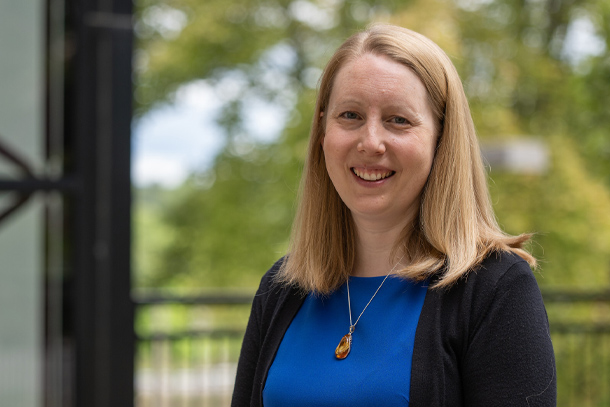
Jacqueline O’Connor, professor of mechanical engineering, was named an associate director of the Penn State Climate Consortium. Credit: Kelby Hochreither/Penn State
Jacqueline O’Connor named to leadership team of Penn State Climate Consortium
May 9, 2024
Editor’s note: A version of this article was originally posted on Penn State News.
UNIVERSITY PARK, Pa. — Jacqueline O’Connor, professor of mechanical engineering, has been named an associate director of the Penn State Climate Consortium alongside Janet Swim, professor of psychology.
“Drs. Swim and O’Connor stand out as strong leaders in the climate space with a deep commitment to the development and deployment of climate solutions," said Erica Smithwick, distinguished professor of geography and director of the Climate Consortium. "Furthermore, their unique research concentrations demonstrate the consortium's ambition to catalyze discovery and progress through collaboration, paving the way for practical climate solutions. Additionally, both leaders possess an extraordinary capacity for inspiring and steering teams toward shared objectives, a crucial skillset in the climate solutions space.”
O’Connor, whose research efforts focus on decarbonization solutions for hard-to-decarbonize sectors like aviation, marine transport and dispatchable power generation, said she is eager to bring her expertise and connections with industry to the consortium.
“Climate solutions require deeply transdisciplinary thinking, which is not something that we’re always trained to do,” she said. “My hope is that the climate consortium can foster this kind of partnership to help increase the impact of our research and its translation to communities and industries. I’m proud of the work already being done at Penn State in climate solutions, and it’s a real honor to help support moving this work forward.”
O’Connor said her recent sabbatical at the Electric Power Research Institute has helped her reach a wider range of players in the energy space who are working towards decarbonization of these challenging sectors.
“One of the most exciting things about working in the climate space at Penn State is the opportunity for collaborative, multidisciplinary thinking,” she said. “In joining the leadership team of the Climate Consortium, I hope to support collaboration and translation of great research into actionable climate solutions.”
Swim studies social and psychological processes that influence environmental decision-making, individual behaviors, and support for environmental public policies. She expanded her research to include climate change more than a decade ago because the human element of climate change required experts on people who could enable successful solutions. The openness and desire for interdisciplinary collaborations led her to want to take a leadership role in the consortium.
“As the years have passed, the ways that social, health and diversity sciences and humanities can contribute are more evident,” Swim said. “It goes beyond understanding and mitigating human contribution to climate change, to understanding physical, mental and community health impacts of climate change as well as ways to build more resilient individuals and communities and how to include diverse voices in solutions.”
During her career, Swim’s collaborations have included communication experts, climate scientists, educators at informal science learning centers and artists depicting their vision of climate change impacts. Her teaching service roles are designed to encourage research and education about climate change.
Swim said one of the most critical challenges in the climate space is connecting the public’s desire for protection from climate threats with solutions that are, and perceived to be, effective, socially and politically feasible, and sensitive to injustices.
“Technological and social climate solutions are available, but they are not one-shot actions,” she said. “They require personal, community and economic investment and social change that sometimes evolves in unanticipated ways. These solutions need to be understood and embraced by the public, and those devising and implementing the solutions need to be responsive to the public's desires, concerns and ideas. The social elements of these challenges inspire me to participate in the Climate Consortium.”
The Penn State Climate Consortium is dedicated to fostering collaboration and accelerating climate change research to develop actionable solutions for a sustainable and just world. Through promoting excellence in research, empowering local-to-global initiatives and leading transitions in climate policy, the consortium aims to inspire creativity and broad engagement in addressing the challenges of climate change.



